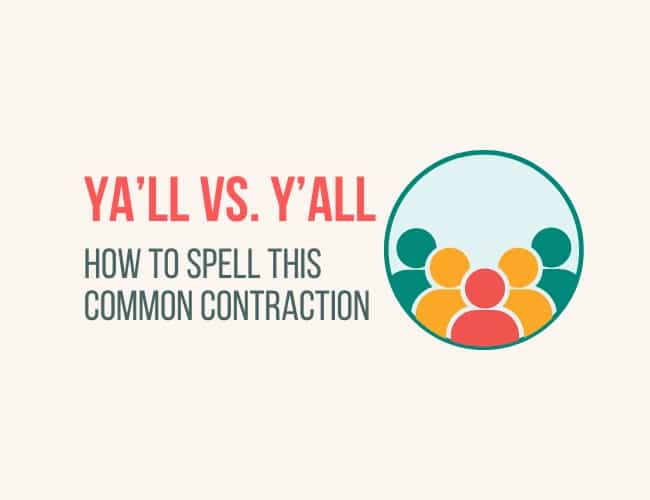Contractions can be tricky things, even before you add in regional colloquialisms. For some reason though, ya'll vs y'all tends to confuse folks. Let's clear this up.

Many people confuse the spelling of ya'll vs. y'all. It's a common contraction and colloquialism that's in wide use even outside the South in the U.S. If you're going to use it in your writing though, you'll need to know the spelling.
But first, let's define colloquialism.
A colloquialism is a term or phrase used in casual, informal conversation or a local or regional term. “Lots of/Lotsa” for “many” is one example: “Lotsa people use colloquialisms regularly.”
One colloquialism that causes spelling problems for many people comes from the southern United States. It's y'all (often misspelled ya'll) and means “all of you” or “you all” in Southern speech.
If we understand the reason behind contractions and how to form them, the problem should become manageable. Let's clear up this common misspelling of a colloquial contraction.
Contraction Rules
A contraction combines two words through elision, the omission of vowels or consonants.
Native English speakers don't, however, drop letters (and sounds) capriciously. The most common contractions involve pronouns (he, she, we, etc.), negatives (not), auxiliary verbs (be, have), and modal verbs (can, would, should, could, and might.)
The first rule of Fight Club—I mean, contractions—is to avoid them in formal writing. Problem solved for anyone presenting a paper to the International Society on General Relativity and Gravitation.
But what about those of us who write less formal texts and represent dialogue in a novel or short story? Contractions are common in speech because they are time savers.
Rules of contraction deserve their own article, but here are two guidelines.
1. Contractions involve combining two (or more) words and deleting one or more letters, which saves time and energy by shortening the utterance.
2. We represent the deleted letters with an apostrophe (not to be confused with the apostrophe that shows possession).
Which brings us to y'all vs. ya'll.
Ya'll vs y'all Correct Spelling
Let's clear up the matter right away.
Y'all is the only correct spelling.
Why?
Since the apostrophe in a contraction represents the letter or letters that have been deleted, when you contract “you all” to “y'all,” the OU of “‘you” are elided. “All” remains “all”‘ Thus, the apostrophe must go after the Y.
Here are some examples of sentences with y'all.
“Y'all come back now, y'hear?” (Closing for each episode of the TV program The Beverly Hillbillies.)
“Did y'all hear the news?” (Did all of you hear the news?)
“What'd y'all do this morning?” (What did you all do this morning?)
“I want all y'all to help with the chores.” (This is an inclusive term because in some regions, “y'all” can be singular, i.e., it refers to one person.)
Tips or best practice for use in writing
Some tips for using “y'all” in writing.
1. Avoid it in formal writing.
2. Use it to make a character or setting more memorable, but don't overuse it. Listen to people who use y'all in real life and follow their example.
3. Recognize y'all as a colloquial regionalism and avoid it with characters who would not speak that way. Other regions have other terms, such as “you guys,” “youse,” “you ‘un,” or “yinz.”
Hopefully that clears up the spelling of y'all for well, y'all.
Want more tips to keep track of tricky words? Check out our post on the difference between pickup and pick up here.
When have you had trouble spelling an odd contraction or common colloquialism? Share in the comments.
PRACTICE
Now it's your turn. Take fifteen minutes to write dialogue for a character or characters who use y'all in their speech. Try to sound as natural as possible.
When you're finished, share your story in the Pro Practice Workshop for feedback from the community. And if you share, please be sure to comment on a few stories by other writers.

Robert Harrell
Robert Harrell is a grammar nerd—and a language teacher, medieval re-creationist, musician, traveler, and theologian. His interests inform his stories and coaching. Published in German, Spanish, and French, with two English-language YA/NA series underway, Robert is pursuing The Write Practice Book Coach Certification to help other writers excel. Learn more at his website.



However, when you follow the norm that the apostrophe followed the first letter of the second word, the contraction must be “ya’ll.”
Hi, Larry: Thank you for your engagement and response to the article. We always appreciate it when people contribute to the conversation.
Could you direct me to where you found the norm of placing the apostrophe after the first letter of the second word? I’ve researched apostrophes for this article and others, but I never found a reference to the norm you mention. It would be great to add a definitive source for that “rule.”
Because none of the authorities (e.g., Chicago Manual of Style, AP Style, MLA, Grammarly, ProWritingAid, Fowler’s, The Elements of Style, etc.) mention placing an apostrophe after the first letter of the second word in a contraction, I speculated as to how that perception could have arisen and noted the following.
For isn’t, aren’t, and other words with “not,” this looks like a good rule. The apostrophe does follow the first letter of the second word.
Unfortunately, it doesn’t work for I’ve, you’ll, he’d, she’s, they’re, and the like. In these cases, the first letter or letters of the second word are missing, so no apostrophe could possibly follow them. Thus, the norm you mention applies only in extremely limited cases, and the phenomenon is easily explained by a more general statement.
When stating a convention if language, we try to express the norm with a formulation as widely applicable and with as few exceptions as possible. From my examples, you can see that the “exceptions” outnumber the rule-keepers. In addition, application of the norm would give us the misspelling oc’lock rather than o’clock. Similar words are jack-o’-lantern (not jack-o-l’antern), ’twas (not tw’as), as in ’twas the night before Christmas, and ma’am (not m’aam), a contraction of madam.
So, how do we explain the phenomenon? By applying the rule given by all the authorities:
One use of the apostrophe is to signal the omission of letters.
This covers all cases of contraction and explains why the apostrophe follows the N of “not”: the O is missing. It also explains why the contraction of “you all” is y’all, and anything else is a misspelling.
I am, of course, always eager to learn and add to my knowledge of language. So, if you have a source for your statement or can provide me with examples of contractions where the apostrophe’s placement isn’t justifiable by some other rule or norm (e.g., the omission rule), I would love to hear it.
Thanks again for engaging with this article, and I look forward to reading your response.
Errata: I noted a couple of typos in one paragraph of my reply, and I would like to correct them.
When stating a convention OF language, we try to express the norm with a formulation as widely applicable and with as few exceptions as possible. From my examples, you can see that the “exceptions” outnumber the rule-keepers IF WE ACCEPT THE NORM YOU GAVE. In addition, application of the norm would give us the misspelling oc’lock rather than o’clock. Similar words are jack-o’-lantern (not jack-o-l’antern), ’twas (not tw’as), as in ’twas the night before Christmas, and ma’am (not m’aam), a contraction of madam, a single word that nevertheless follows the rule that an apostrophe represents a missing letter or letters.